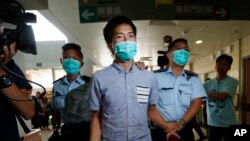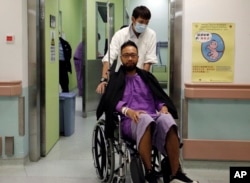A Hong Kong pro-democracy protester has come before the media to show bruises he says were sustained when he was beaten by police on Wednesday.
Showing the scrapes and bruises on his face and torso, Ken Tsang told reporters he is seeking legal advice for his ordeal.
"You should have seen the TV footage of a number of police officers brutally assaulting me while I was retained and entirely defenseless," he said. "Prior to that, I had already been assaulted and was later assaulted yet again in the police station."
Human rights groups are expressing outrage after several Hong Kong police were caught on camera beating Tsang, who was unarmed and handcuffed.
The incident happened Wednesday during a police attempt to clear demonstrators blocking an underpass on a key road near government headquarters.
Video footage by local television station TVB showed six plainclothes officers dragging a social worker into the darkened entrance of a building, where they repeatedly kicked and punched him for four minutes.
The territory's security chief, Lai Tung-kwok, told reporters the officers involved in the incident have been reassigned and that an investigation is ongoing.
In a statement, Amnesty International said the officers must also face prosecution for what it called the "vicious attack against a detained man who posed no threat to the police."
Amnesty's Hong Kong director, Mabel Au, called the incident "stomach-churning."
"Amnesty strongly condemns the police beating up the peaceful protesters. From the TV clips we can see that Ken is just, he was taken away by police, and at that time he was already handcuffed by the plastic strips," Mabel Au said.
The Asian Human Rights Commission also expressed "shock and sadness" at the incident and called for the officers to be arrested and "brought before the law as early as possible."
The commission has set up a hotline for protesters who witness police brutality during the crackdown on the Hong Kong pro-democracy protesters.
Hundreds of police Wednesday used pepper spray and batons, and in some cases punched and tackled protesters to the ground during the clashes in the Admiralty district.
A police statement said 45 people were arrested. It added that four officers also received injuries, including a dislocated shoulder, a poked eye, and abrasions.
Protesters stormed the Lung Wo Road tunnel after police cleared other barricades at nearby demonstration sites the last two days, a move they say is aimed at freeing up roads blocked by the protests.
A 22-year-old protester, Samuel Lam, said he hopes blocking roads will force concessions from the government, which has refused to meet protesters' demands for electoral reforms.
"If we keep occupying different streets, and this may give some pressure to [the government], because they cannot control us," said Lam.
Police say they reacted peacefully in the early morning operation to clear the tunnel, but video recorded by local media suggests otherwise.
Tycoon urges protesters disperse
Hong Kong billionaire Li Ka-shing on Wednesday urged pro-democracy protesters who have occupied the heart of the city for more than two weeks to go home to their families.
Li, Asia's richest man and chairman of property developer Cheung Kong, also said in a statement that if the rule of law broke down it would be the “greatest sorrow” for the Chinese-controlled city.
It was the first time he had made public comments on the protests.
The operation is the toughest police response since late September, when authorities tried unsuccessfully to break up the protests using pepper spray and tear gas, a move that helped garner support for the protests.
Since then, police have taken a more restrained approach, and the protests have slowly begun to lose public support, especially from those trying to do business in the demonstration zones.
The demonstrations began in late September with the protesters, many of them university students, calling for the leader of the semi-autonomous city to resign and for the Chinese government to let Hong Kong voters elect their own leader without restrictions on candidates.
Chief Executive Leung Chun-ying has said he will not step down. His government initially agreed to hold talks with protesters, but eventually backed down, leading student leaders to expand their demonstrations.
Some material for this report came from Reuters.











